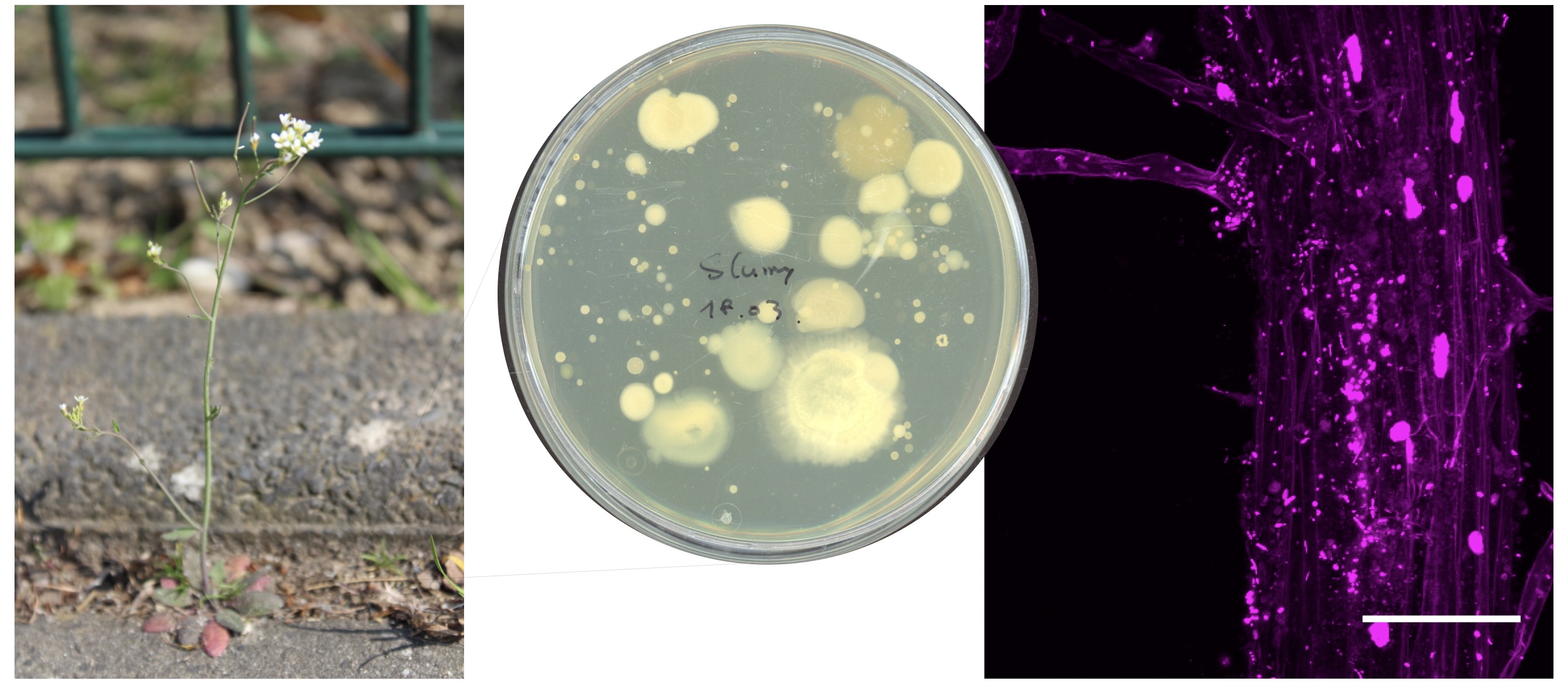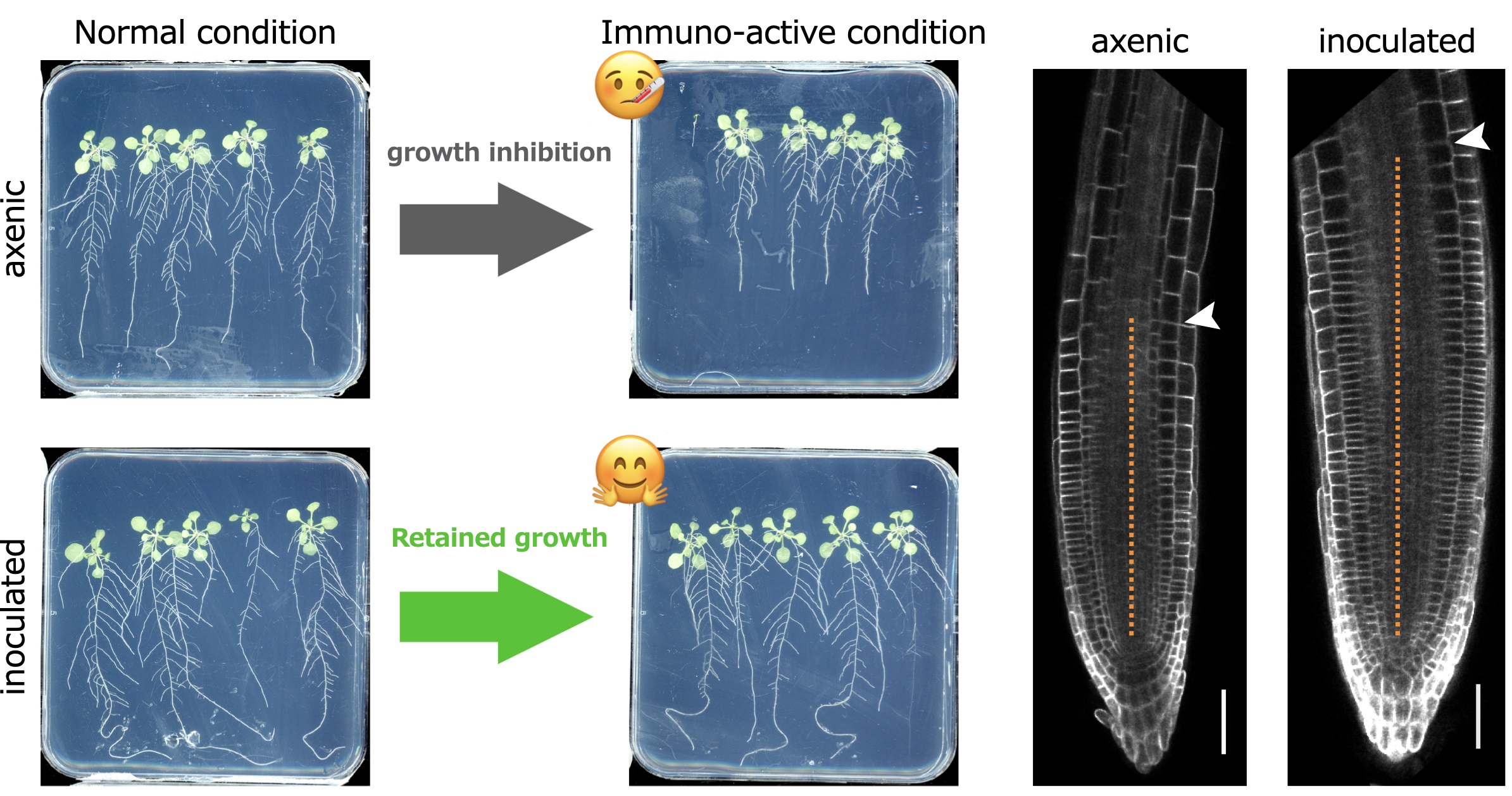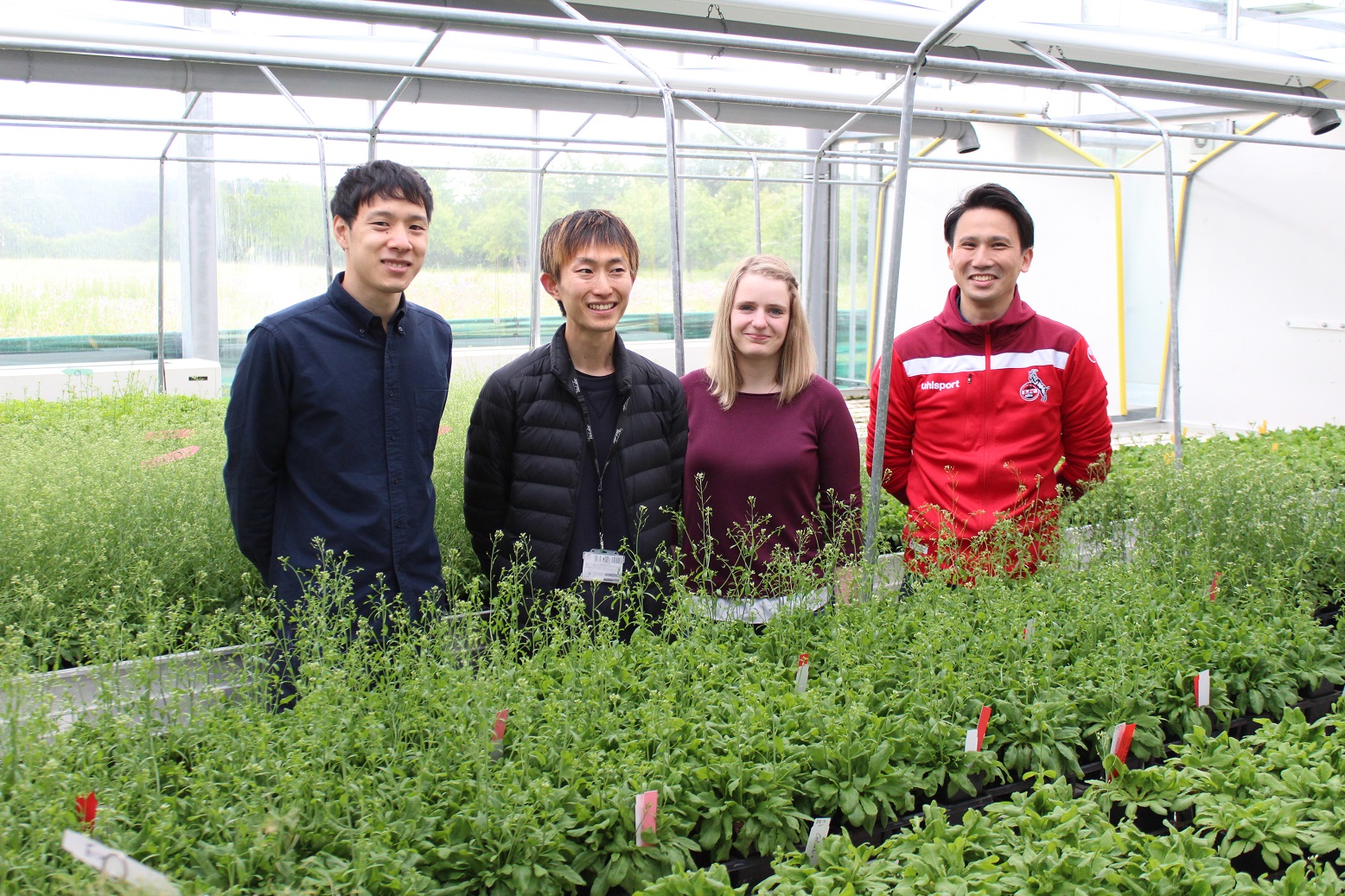NAKANO Ryohei Thomas
Professor
Microbes are a part of plants
Department of Biological Sciences, Cell Structure and Function

| Theme | We aim to understand how plants coordinate growth and defense in the presence of microbiota at the cellular and molecular levels. |
| Field | Plant Microbe Interactions, Molecular Genetics, Cell Biology, Biochemistry, Molecular Ecology |
| Keyword | Microbiota, Plant Immunity, Root Development, Growth-defense Tradeoff, Environmental Responses, Multi-omics, Bioinformatics |
Introduction of Research
Plants in nature are exposed to a tremendous variety of microbes. Similar to our gut and skins, plant roots and leaves are heavily colonized by these microbes, constituting a plant-associated microbial community called the "plant microbiota". Our research aims to understand how these commensal microbes influence plant growth and defense.
To support the growth of aboveground tissues, roots grow into soils that contain a complex microbial ecosystem. It may contain not only beneficial microbes providing goods to plants but also pathogenic microbes potentially causing severe disease symptoms. Plants cope with these microbes by so-called plant immunity, avoiding unwanted infection by these pathogens.
However, it is also known that overactivation of immunity results in growth restriction, similar to the allergic hypersensitive response we frequently experience – especially if you have severe hay fever. It has been a mystery how plants balance growth and immunity in the presence of soil microbes, and we recently found that root microbiota members ("commensal microbes") play a pivotal role in root growth-defense coordination.
Our fundamental research interest is to understand how plants coordinate root growth and immunity in the presence of such a complex microbial community. Addressing this question would allow us to reveal the true art of life of plants living in nature using the words of molecular genetics. Ultimately, we may uncover the trajectory of land plant evolution mediated by the interaction with soil microbe, or we may build a basis for developing sustainable agricultural practices without heavily relying on chemical fertilizers and pesticides.
As in the case of plant microbiota, what matters in a research group is its diversity. We aim to build a group with different ideas, views, perspectives, cultures, genders, religions, and career and life event options, because the synergy created by such diversity is instrumental for pursuing truly innovative, exciting, and fun science. If you feel us and are interested in being a part of us, just come by our lab, and we can always have a chat about how plants and microbes are fascinating.


Representative Achievements
Tomohisa Shimasaki, Sachiko Masuda, Ruben Garrido-Oter, Takashi Kawasaki, Yuichi Aoki, Arisa Shibata, Wataru Suda, Ken Shirasu, Kazufumi Yazaki, Ryohei Thomas Nakano#, Akifumi Sugiyama#.
mBio 12:e00846-21 (2021). #Co-corresponding authorship.
Tomohiro Uemura*, Ryohei Thomas Nakano*, Junpei Takagi, Yiming Wang, Katharina Kramer, Iris Finkemeier, Hirofumi Nakagami, Kenichi Tsuda, Takashi Ueda, Paul Schulze-Lefert, and Akihiko Nakano.
Plant Physiol. 179 (2) 519-532 (2019). *Co-first authorship.
Ruben Garrido-Oter*, Ryohei Thomas Nakano*, Nina Dombrowski*, Ka-Wai Ma, The AgBiome Team, Alice C. McHardy, and Paul Schulze-Lefert.
Cell Host & Microbe 24(1), 155–167 (2018). *Co-first authorship.
Ryohei Thomas Nakano, Mariola Piślewska-Bednarek, Kenji Yamada, Patrick P. Edger, Mado Miyahara, Maki Kondo, Christoph Böttcher, Masashi Mori, Mikio Nishimura, Paul Schulze-Lefert, Ikuko Hara-Nishimura, and Pawel Bednarek.
Plant J. 89: 204-220 (2017)

| Academic degree | Doctor of Science (Ph.D. equivalent) |
| Self Introduction | I was born in the US, grew up in Tokyo, studied in Kyoto, and spent the last 10 years in Köln (Germany) as a postdoctoral researcher before I moved to Sapporo as a professor in the Department of Biological Sciences. My research interest is to understand the art of life of plants in the presence of microbes at the cellular and molecular levels. I like to get myself soaked in music, play some instruments (guitar, piano, trombone, and euphonium), and watch football matches (mostly of 1.FC Köln), though I am mostly spending my private time taking care of four kids, including twins. |
| Academic background | 2007 B.Sci. Faculty of Science, Kyoto University 2009 M.Sci. Graduate School of Science, Kyoto University 2009 JSPS Research Fellow (DC1) 2012 Ph.D. Graduate School of Science, Kyoto University 2012 Postdoctoral Researcher, Kyoto University 2013 Postdoctoral Researcher, Department of Plant Microbe Interactions, Max Planck Institute for Plant Breeding Research 2013 JSPS Overseas Research Fellow 2019 Principal Investigator, Department of Plant Microbe Interactions, Max Planck Institute for Plant Breeding Research 2023 Professor, Department of Biological Sciences, Hokkaido University |
| Affiliated academic society | The Japanese Society of Plant Physiologists, The Botanical Society of Japan, The Phytopathological Society of Japan, International Society for Molecular Plant-Microbe Interactions |
| Room address | Science Building 5, 5-706 |

